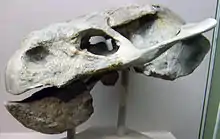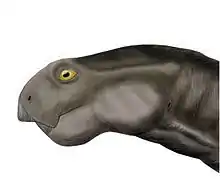Oudenodon
Oudenodon is an extinct genus of dicynodont. It was common throughout southern Africa during the Late Permian. Several species of Oudenodon are known.[2] Both O. bainii, the type species, and O. grandis are known from South Africa.[3][4] Specimens of O. luangwensis have been found from Zambia.[5] One species, O. sakamenensis, is the only therapsid yet known from Madagascar.[6] It is the type genus of the family Oudenodontidae, which includes members such as Tropidostoma.
| Oudenodon Temporal range: Late Permian | |
|---|---|
 | |
| O. baini skull at the Museum für Naturkunde, Berlin | |
| Scientific classification | |
| Kingdom: | Animalia |
| Phylum: | Chordata |
| Clade: | Therapsida |
| Clade: | †Dicynodontia |
| Family: | †Oudenodontidae |
| Genus: | †Oudenodon Bain, 1856 |
| Species | |
| |
| Synonyms | |
and others | |

Restoration of Oudenodon bainii

Oudenodon latirostris skull
See also
References
- Boonstra, L. D. (1938). A report of some Karoo reptiles from the Luangwa Valley, Northern Rhodesia. Quaternary Journal of the Geological Society of London 94:371-384.
- King, G. (1988). Anomodontia. Encyclopedia of Paleoherpetology 17C:1-174.
- Owen, R. (1860). On some reptilian fossils from South Africa. Quaternary Journal of the Geological Assotiation of South Africa 67:1-110.
- Haughton, S. H. (1917). Investigations in South African fossil reptiles and Amphibia. Part 10. Descriptive catalogue of the Dicynodontia. Annals of the South African Museum 12:127-174.
- Keyser, A. W. (1975). A re-evaluation of the cranial morphology and systematics of some tuskless Anomodontia. Memoir of the Geological Society of South Africa 67:1-110.
- Mazin, J. M. and King, G. M. (1991). The first dicynodont from the Late Permian of Malagasy. Palaeontology 34:837–842.
External links
| Wikimedia Commons has media related to Oudenodon. |
- Oudenodon in the Paleobiology Database
This article is issued from Wikipedia. The text is licensed under Creative Commons - Attribution - Sharealike. Additional terms may apply for the media files.





